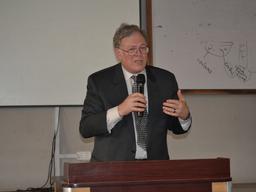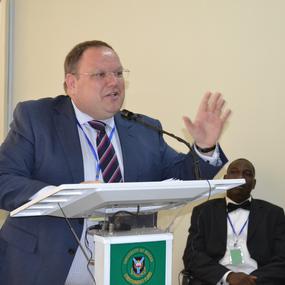“Justice for all” was the concern of participants at the recently concluded International Conference on Law and Religion held at the International Conference Centre of the University of Ibadan, Nigeria.
The five-day event took place from April 24-28, 2017, with the theme “Law and Religion: The Role of the State.”
- Delegates
- Group
- Ghana
- Guests
- Discussion
- Speaker
- Morning Prayer
- Delegates assemble
- Assembled
- Cole Durham
- Filled
- Present
- Roundtable
| Temple Square is always beautiful in the springtime. Gardeners work to prepare the ground for General Conference. © 2012 Intellectual Reserve, Inc. All rights reserved. | 1 / 2 |
The International Center for Law and Religion Studies at Brigham Young University, Utah, United States, partnered with the West African Centre for Law and Religion Studies at the University of Lagos, the Nigeria Judicial Institute and the University of Ibadan to organize the conference. Brigham Young University is a private institution, owned and operated by The Church of Jesus Christ of Latter-day Saints.
The first day featured a conference of the Nigeria Judicial Expert Group on Law and Religion Studies. This part of the programme bringing together 25 judges from the Sharia Court to the Court of Appeal in Nigeria and about 50 professors of law and religion from Nigeria, the United States, United Kingdom, Ghana, Cote D’Ivoire, Sierra Leone and Benin Republic.
Speakers on this day focused on the need for each individual to be protected and assured of receiving justice, regardless of the society to which he or she may belong.
According to Honourable Justice Helen M. Ogunwumiju of the Court of Appeal, ‘’We are all under the state. So, the state is the father of all and must be able to accommodate all religions. It is only where the practice of your own religion will affect the security of the society that the state should interfere. This is the main essence of the conference—that we should live in harmony and be tolerant with one another.”

Other first-day speakers included Cole Durham Jr., founding director of the International Center for Law and Religion Studies at Brigham Young University; Akin Ibidapo-Obe, former Dean of the Faculty of Law at University of Lagos and President of the West African Centre for Law and Religion Studies; Prof. Mark Hill, Queen’s Counsel and professor at the Dickson Poon Law School at Kings College, London; Adeniyi Olatunbosun, Dean of the Faculty of Law at the University of Ibadan; Ayo Atsenuwa, Dean of the Faculty of Law at the University of Lagos; Kofi Quashigah, Dean of the Faculty of Law at the University of Ghana; and Taufik Ladan, Department of Public Law at Ahmadu Bello University, Zarria.
Day two of the event featured a symposium that brought together academics and faith and community leaders. Their objective was to find a meeting point for law, religion and the government that would ensure justice and fairness for all.

In his keynote address during the symposium, Prof. Ademola Popoola, Dean of the Faculty of Law at Obafemi Awolowo University Ile-Ife stated, “Law is at the foundation of every ordered human society. Religion, on the other hand, has always been a highly emotive subject. It strikes at the core of the being of the man and woman. To many, it is a necessity for humanity. In reality, it is also ‘a thriving political force’ in developing societies, and even in the developed ones.’’
Speaking on “Reconciling Religious Beliefs and Tradition,’’ HRM Oba (Dr.) Michael Odunayo Ajayi, Arowotawaya II, a traditional ruler, the Elerinmo of Erinmo Ijesa, stated there are four foundational religious beliefs in the traditional religions, namely the belief in impersonal (mystical) power(s); the belief in spirit beings; the belief in divinities/gods and the belief in the Supreme Being.
He stated that any meaningful and effective approach to the reconciliation of religious belief and tradition must begin with the understanding of these foundational beliefs, “As a traditional ruler, I am the father of all within my domain, therefore, I cannot afford to discriminate against anyone or any religion. I practice all religions within my kingdom.”
Another conference speaker, Alhaji Kunle Sanni, Chairman, Oyo State Muslim community, wondered if it would ever be possible to have completely secular state. He noted the state itself practices religion, citing examples of the national anthem—a prayer that ends with “so help me God”—and oath taking in the courts done with the Qur'an or the Bible. He concluded by saying the state needs religion to promote morality and value in society.
The rest of the conference period included a three-day intensive course on law and religion studies for lecturers and students of law, religion and philosophy. The lecturers and students trained together in the mornings, while the lecturers were trained separately in the evenings.
The training was conducted by Prof. Cole Durham Jr., Prof. Mark Hill, Prof. Akin Ibidapo-Obe and Prof. Kofi Quashigah. 571 students and 27 lecturers participated.
At the end of the training, all facilitators and lecturers from the participating universities agreed to work toward establishing Law and Religion Studies as a general-studies course for tertiary institutions in Nigeria and other participating countries. All participants received a certificate of course completion.